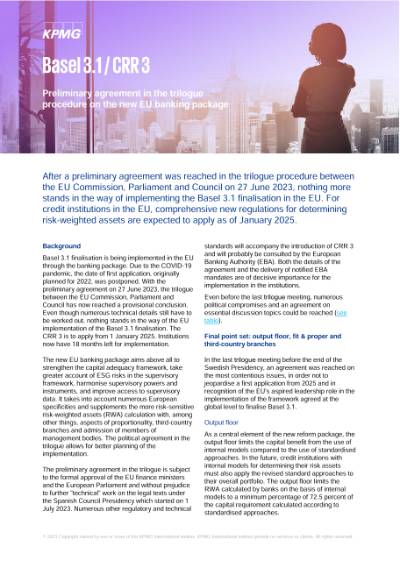Welcome to the KPMG Global Insights page for Basel reforms. Here you will find regulatory updates and analysis, links to KPMG solutions and details of key contacts across KPMG’s international network. For our latest views, see the “Moving the dial” series.
As final rules emerge and are finalised, it is time for banks to focus firmly on the implementation of the Basel 3 final reforms, variously referred to as Basel 4, Basel 3.1 or Basel 3 Endgame.
Implementation was delayed due to the pandemic, but regulators around the globe are now pushing ahead with their plans. The Basel Committee on Banking Supervision has been clear that a ‘full and consistent’ implementation of the framework should be targeted ‘as soon as possible’. However, timelines are not consistent across all jurisdictions and banks will also need to consider local variations in final requirements.
Key dates
Standards published 2017
Proposed implementation timeline from 1 January 2023 with phasing in of output floor to 1 January 2028
European Commission proposed amendments to Capital Requirements Regulation (CRR3) in October 2021
Adopted by European Parliament January 2023
Provisional agreement following trilogue June 2023
Final rules expected end Q4 2023
Implementation from 1 January 2025 with phasing in of output floor to 1 January 2030 (some other transitional measures)
PRA consultation on UK implementation closed 31 March 2023
Final rules expected in 2 tranches: Q4 2023 (for market risk, credit valuation adjustment (CVA) risk, counterparty credit risk and operational risk) and Q2 2024 (for credit risk, output floor, reporting and disclosure requirements)
Implementation from 1 July 2025 with phasing in of output floor to 1 January 2030
PRA has advised banks to submit applications for IMA permissions under FRTB 12 months before implementation begins and, for IRB, 6 months before implementation begins.
Notice of Proposed Rulemaking (NPR) July 2023
Implementation from 1 July 2025 to 1 July 2028
Implementation dates vary – typically from 2024 to 2025 with a 5-year phase-in for the output floor
Oil and gas companies will be essential in the global effort to reduce carbon emissions and transition to a cleaner energy future and that energy transition cannot happen without the active participation of the oil and gas sector. The role of a balanced portfolio is a crucial part of the overall strategy in the transition to cleaner energy.
Related perspectives and insights
How KPMG can help
Basel 4 is broad in scope and impact. KPMG has the credentials and expertise to support you in all aspects of your Basel 4 implementation including:
- Carrying out gap assessments and implementation plans
- Planning for and managing any increase in capital requirements
- Upgrading data, systems and (internal and external) reporting
- Applications to use internal model approaches (where these are still available)
- Asset portfolio adjustments and balance sheet optimisation in response to changes in risk weightings
- Assessing the revised capital standards in the context of all other regulatory reforms and market developments
Frequently Asked Questions
KPMG is developing a bank of frequently asked questions to share with our clients. If you would like to submit a question for our industry experts, please send it to mailto: go-fmemafsriskandreg@kpmg.com.
Please note that this forum is for technical or regulatory questions. Please do not submit client-specific enquiries via this link.
Contact us
Further insights


















